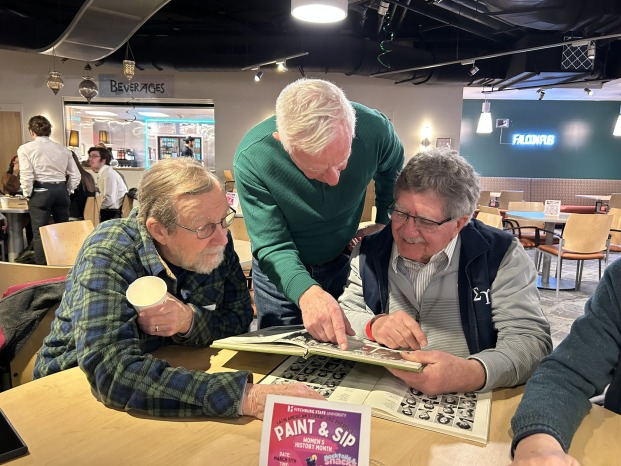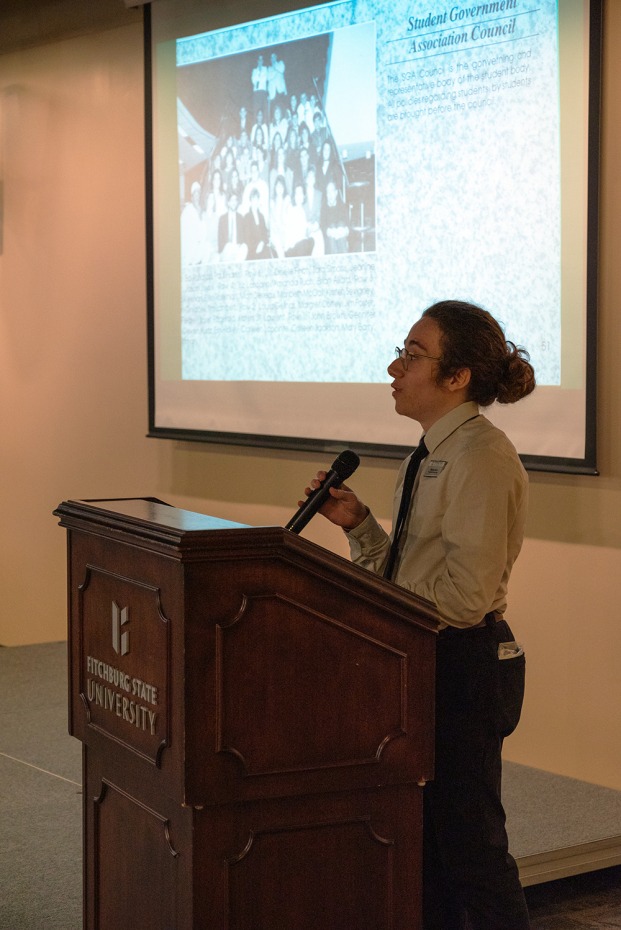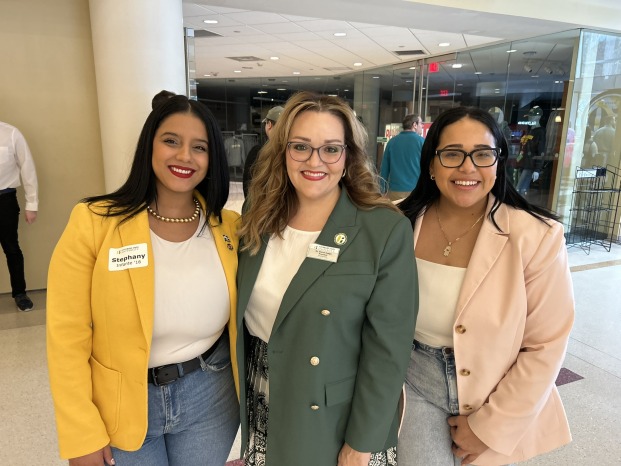In 1923, students at the Fitchburg Normal School incorporated a new entity on campus: the Student Government Association. The body has endured in the century since, providing a voice for students to advocate for issues that matter to them, and a mechanism for them to cultivate leadership skills that will transcend their time on campus.
That continuum was in strong evidence when the campus hosted the SGA reunion in Hammond Hall, assembling current and former student leaders from the 1960s to the present for reflection and community.
President Hodge saluted the participants for their shared willingness to look at the status quo and imagine something better, a philosophy that has served them well in their lives and careers ever since.
“Wherever your paths have led—whether to boardrooms, classrooms, hospitals, courtrooms, or communities—you have carried the lessons of service, collaboration, and courage. You are the embodiment of the values we hold dear at Fitchburg State: excellence, integrity, and an unwavering commitment to lifting others as you climb,” Hodge said. “Today, we celebrate you—not just for what you have accomplished, but for the legacy you have left behind. The students who now walk the paths you once walked are benefitting from the foundation you built, the policies you shaped, and the vision you championed. Your fingerprints are still on this campus, and your influence still guides the next generation of student leaders.”
Current SGA President Michael Burns ‘26 recounted the history of student leadership on campus, including efforts to get students registered to vote and advocating to campus leadership on the impact of raising fees.
“Each of these moments reminds us of something essential: progress is never easy, but it is always possible,” Burns said. “And we see that progress every single day. I see it in the student who steps up to run for Senate, not because they seek a title, but because they believe their peers deserve a voice. I see it in the organizations we fund, the services we protect, and the representation we fight to improve; knowing that the work we do today will shape the experience of students who walk these halls long after we have left.”
The work, he said, is proof that SGA is not just about governance. “It is about leadership. It is about growth. It is about stepping into something bigger than yourself and realizing that, together, we have the power to change things,” Burns said. “Every single person in this room, whether you were here in the ’80s, the ’90s, the early 2000s, or today—has carried the torch of student advocacy. Every person in this room has played a role in shaping this university. And now, as we gather in celebration, as we look back on all that has been accomplished, we must also look forward. Because the work is never done.”
The former SGA members and class leaders who attended recalled the importance of their leadership experiences on campus, and the life skills that have informed them in the months, years and decades since their service.
Every person in this room has played a role in shaping this university. And now, as we gather in celebration, as we look back on all that has been accomplished, we must also look forward. Because the work is never done.
Michael Kushmerek ‘08, ‘13 said it was his time in student government that set him on a path to elective office, first on the Fitchburg City Council and now as a state representative in the Legislature.
“It was here that I learned about complex issues, and that not everyone was going to agree on every side,” Kushmerek said. “We all agreed with where we wanted to get to, but it was how do we get there?”
It was in those meetings that Kushmerek learned that everyone was representing a constituency that mattered to them, and that maintaining collegial relationships was crucial. “These people have become a core group of advisors for me at every stage of my career,” he said. “
“This is a politically fraught moment in our nation’s history,” Kushmerek continued. “I look for hope and optimism, and I feel it in rooms like this, with young people like this.”
Eric Gregoire ‘13, currently the alumni representative to the university’s Board of Trustees, served as a student representative during his undergraduate days. “One of the greatest lessons from SGA is service to a greater mission, and recognizing there will be more behind us to continue that work,” he said.
He recalled losing his first student election but finding encouragement to continue from supportive mentors on campus including Professor Joshua Spero, who was in attendance at the reunion.
“If you have the urge to want to contribute, there’s a place for you at Fitchburg State,” said Gregoire, encouraging alumni in attendance to look for ways for them to stay engaged with the university.
That passion for engagement transcends generations, as shown by the recollections of alumni in attendance at the reunion.
Richard Maiolo ‘70 was active in student government and used his influence to lobby then-President James Hammond to establish a hockey team on campus. It started as a club, and has grown into one of the university’s most storied athletic programs.
“Student government gave me leadership skills that helped me in business,” said Maiolo, who started his career as a teacher and later became an entrepreneur. “I learned how to read people and assess their abilities and use their skills to make them and their business better.”
Looking at old yearbooks and news clippings with other longtime friends reminded him of the foundational experiences he enjoyed at Fitchburg State. “I’m still in touch with a lot of those friends,” Maiolo said. “We saw each other at our best and at our worst.”
John Marion ‘69, ‘73 was active with the Mohawks during his undergraduate days, and there were a lot of Mohawks engaged in campus leadership. “We were really proud of that fact,” he said.”
Marion’s service included terms as class president and SGA treasurer. He also met lifelong friends, including Joann (Trzcinski) Marion ‘71, ‘83. “I told her, ‘Someday I’m going to marry you,’ and that’s what happened,” John recalled.
Joann, retired from a career in education that included serving as a school principal in Colorado, said her time in student government at Fitchburg State was transformative. “I was 17 when I started here,” she said. “I never dreamed I’d become a public school administrator. (Student leadership) does so much for your confidence.”
James Besarkarski ‘68, ‘71 recalled having 11 roles on campus during his senior year, including editor of the campus newspaper and the yearbook. Now retired from a long teaching career, Besarkarski remains active in local government in Lunenburg, including 30 years on its Zoning Board of Appeals. “Service carried on throughout my career,” he said. “You try to make a difference and help as many people as you can.”
Michael Kurgan ‘72 was part of the first All College Council through his involvement with student government. That panel was a way to incorporate student and faculty voices in campus governance, and remains a vital force (now known as the All University Committee). Kurgan knew students involved in the landmark court case that pitted students against administration over censorship of its student paper. “They were hellraisers, and rightfully so,” he said.
Kurgan enjoyed a long and successful career in education and administration, and recalls his time in student government as fundamental to his development. It also forged lifelong ties with people he still calls close friends. “I’ve never lost my connection to Fitchburg State, and we keep in contact,” he said. “Fitchburg State was an important part of our lives.”
Alexandra Valdez ‘15, currently the executive director of the Office of Cultural Affairs for Boston Mayor Michelle Wu (and a Boston City Council candidate), said her experiences with SGA helped shape her continued commitment to public service.
“I transferred to Fitchburg State as a junior, and I wanted to get involved,” said Valdez. “Community service has always been important to me. Here, I was able to create a space where everyone could feel welcome.”
Stephany Infante ‘16 is currently vice chair of the Lawrence City Council, where she remains the youngest person ever elected to that body. Infante said her experience in student government helped strengthen her for the road ahead, recalling a hard-fought battle in her first election on campus. “That showed me the importance of being transparent and true to the process,” Infante said. “I still hold on to that as a City Councilor.




